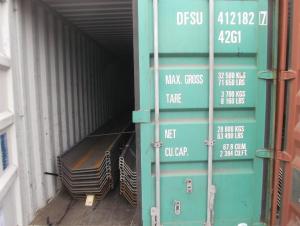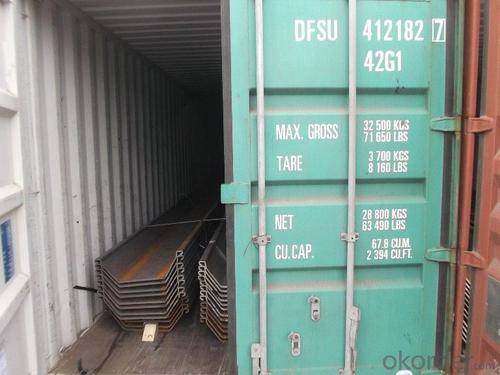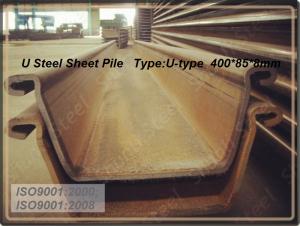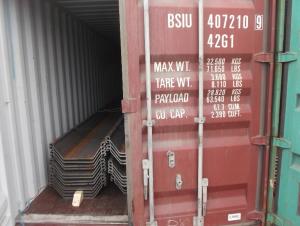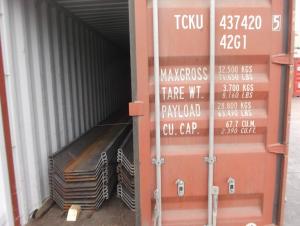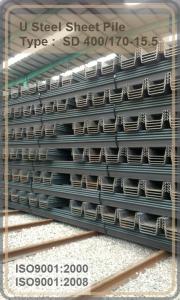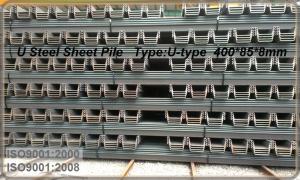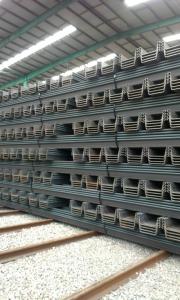U Steel Sheet Pile/ 400*125*13mm/ Export Steel Sheet Pile with High Quality
- Loading Port:
- China Main Port
- Payment Terms:
- TT or LC
- Min Order Qty:
- 200 Piece/Pieces m.t.
- Supply Capability:
- 10000 m.t./month
OKorder Service Pledge
OKorder Financial Service
You Might Also Like
Quick Details Steel Sheet Pile
Place of Origin: China (Mainland)
Model Number:SD400/125-13
Material: Steel
Product name: Steel Sheet Pile
Steel sheet pile type: U-type
Steel sheet pile material: SY295
Steel sheet pile width: 400mm
Steel sheet pile height: 125mm
Steel sheet pile thickness: 13mm
Steel sheet pile length: 6m or 12m
Steel sheet pile loading: container , 20 ft or 40GP
Steel sheet pile used: temporary earth-retaining,temporary cofferdam works
Steel sheet pile weight: 60kgs / m
Packaging & Delivery
| Packaging Details: | packaging :by bulk . loading : container 20ft or 40GP |
|---|---|
| Delivery Detail: | stock ( more type has stock ) |
Specifications
Steel Sheet Pile 400*125*13mm
U Steel Sheet Pile
temporary earth-retaining/temporary cofferdam works/permanent structures
Export U Steel Sheet Pile 400*125*13mm
Product Description
Steel Sheet Pile Usage
emporary earth-retaining, temporary cofferdam works and permanent structures
Steel Sheet Pile Type : SD 400/125-13
Type | Size | Per piece | Per Meter of pile wall | ||||||||
Width | Height | Thickness | weight | section area | section moment | section modulus | section area | section moment | section modulus | weight | |
mm | mm | mm | kgs /m | cm2 | cm4 | cm3 | cm²/m | cm4/m | Cm³/m | kg/m² | |
SD400/85-8 | 400 | 85 | 8 | 35.5 | 45.21 | 598 | 88 | 113 | 4500 | 529 | 88.80 |
SD400/100-10.5 | 400 | 100 | 10.5 | 48 | 61.18 | 1240 | 152 | 153 | 8740 | 874 | 120.10 |
SD400/125-13 | 400 | 125 | 13 | 60 | 76.42 | 2220 | 223 | 191 | 16800 | 1340 | 149.90 |
SD400/150-13.1 | 400 | 150 | 13.1 | 58.4 | 74.4 | 2790 | 250 | 186 | 22800 | 1520 | 146.00 |
SD400/170-15.5 | 400 | 170 | 15.5 | 76.1 | 96.99 | 4670 | 362 | 242.5 | 38600 | 2270 | 190.40 |
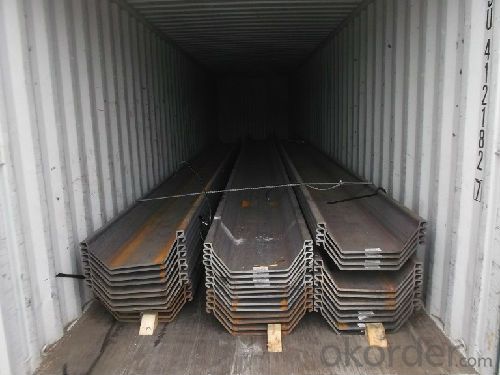
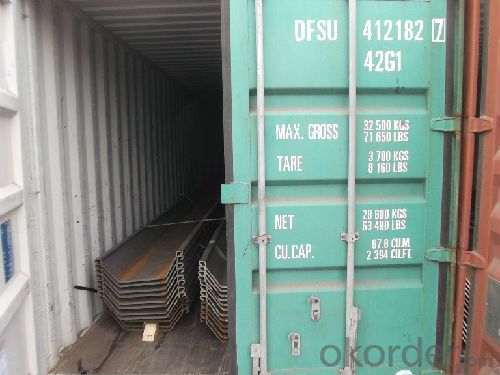
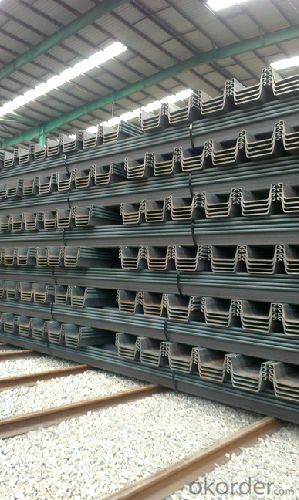
Packaging & Shipping
Packing : it use container to load , 6M use 20ft container ; 12M use 40GP container .
Our Services for Steel Sheet Pile
World leading manufacturer of cold-formed Sheet Pile.
Factory got a variety of quality certification : ISO9001:2000; ISO9001:2008.
Our products popular applicated for temporary earth-retaining, temporary cofferdam works and permanent struc
- Q: Can steel sheets be used in acidic environments?
- In acidic environments, steel sheets can be utilized, but it is crucial to select the appropriate steel and take necessary precautions. Stainless steel, especially grades containing high levels of chromium and nickel, exhibits remarkable resistance against corrosion and can endure acidic environments. When these steel sheets come into contact with oxygen, they develop a passive protective layer on their surface, which halts further corrosion. Nevertheless, not all steel types are suitable for acidic environments. Carbon steel, for instance, is susceptible to corrosion under acidic conditions and is not recommended for such applications. Furthermore, the concentration and temperature of the acid can impact the performance of steel sheets. To ensure optimal performance in acidic environments, it is advisable to seek advice from steel suppliers or corrosion engineers who can suggest the most suitable steel type for specific conditions. Regular monitoring and maintenance of the steel sheets are also important to prevent any potential damage or corrosion.
- Q: Can steel sheets be used for manufacturing security doors?
- Indeed, security doors can be manufactured using steel sheets. Steel, being a robust and long-lasting material, offers exceptional security and safeguarding. It possesses the ability to withstand forced entry attempts and provides resistance against break-ins. Due to their remarkable tensile strength, steel sheets are frequently employed in the construction of security doors as they are difficult to bend or break. Moreover, steel doors can be further reinforced with various additional features, including multiple locks, deadbolts, and security bars, to enhance their security capabilities. All in all, steel sheets serve as a dependable option for the production of security doors.
- Q: Can steel sheets be used in the defense industry?
- Yes, steel sheets can be used in the defense industry. Steel is a versatile and strong material that can be used for various applications such as armor plating, vehicle manufacturing, and construction of military infrastructure. Its durability and resistance to impact make it suitable for protecting military equipment and personnel, making it an essential component in the defense industry.
- Q: How do steel sheets compare to other materials like aluminum or plastic?
- Steel sheets offer several advantages over other materials such as aluminum or plastic. Firstly, steel is notably stronger and more durable than both aluminum and plastic. It possesses a higher tensile strength and can withstand significantly greater loads and impacts. As a result, steel sheets are more suitable for applications that demand high strength and structural integrity, like the construction, automotive, and aerospace industries. Secondly, steel exhibits greater resistance to extreme temperatures and fire compared to aluminum or plastic. With a higher melting point, steel sheets are less likely to deform or lose their structural integrity under high temperatures. This characteristic makes them ideal for applications involving exposure to heat or fire, such as industrial furnaces or fire-resistant structures. Moreover, steel sheets offer superior corrosion resistance when compared to aluminum or plastic. Steel can be coated with various protective layers like zinc or paint to prevent rusting and corrosion. Conversely, aluminum is prone to corrosion in specific environments, while plastic may degrade and become brittle over time. Consequently, steel sheets are a more reliable choice in applications where exposure to moisture or corrosive substances is a concern, such as marine environments or chemical processing plants. Lastly, steel sheets are more environmentally friendly than both aluminum and plastic. Steel is a recyclable material that can be reused indefinitely without losing its properties. On the other hand, aluminum recycling requires significantly more energy, and plastic has a known detrimental impact on the environment due to its slow decomposition. Therefore, for those seeking environmentally friendly options, steel sheets, being recyclable and sustainable, are the preferred choice. In conclusion, steel sheets surpass materials like aluminum or plastic in terms of strength, durability, resistance to extreme temperatures and corrosion, as well as being more environmentally friendly. However, the specific choice of material ultimately depends on the application requirements, cost considerations, and other factors.
- Q: 16 what is the hardness of manganese steel plates?
- Manganese steel is a kind of steel with high strength. It is mainly used in harsh working conditions, such as impact, extrusion and material wear. The form of failure is mainly wear and tear, and it is partly broken and deformed.
- Q: Do steel sheets rust?
- Yes, steel sheets can rust if they are not properly protected or coated.
- Q: How long do steel sheets last?
- Steel sheets can last for many years, often surpassing the lifespan of other materials. The longevity of steel sheets depends on various factors such as the quality of the steel, the conditions it is exposed to, and how well it is maintained. In general, high-quality steel sheets that are properly installed and maintained can last for several decades or even longer. However, if steel sheets are exposed to harsh environments, such as extreme temperatures, humidity, or corrosive substances, their lifespan may be reduced. Regular inspections, cleaning, and maintenance can help extend the lifespan of steel sheets and ensure their durability over time.
- Q: Can steel sheets be painted after installation?
- Yes, steel sheets can be painted after installation. The paint can adhere to the surface of the steel sheets, providing protection against corrosion and enhancing their appearance.
- Q: What are the different types of steel sheet finishes for marine applications?
- Some of the different types of steel sheet finishes for marine applications include hot-dip galvanized, stainless steel, and epoxy coatings.
- Q: How do you store steel sheets to prevent damage?
- To prevent damage to steel sheets, it is recommended to store them in a dry, well-ventilated area, away from moisture or humidity. They should be stored horizontally on a flat surface, with adequate support to prevent bending or warping. Additionally, using protective covers or separators between each sheet can help prevent scratches or surface damage.
Send your message to us
U Steel Sheet Pile/ 400*125*13mm/ Export Steel Sheet Pile with High Quality
- Loading Port:
- China Main Port
- Payment Terms:
- TT or LC
- Min Order Qty:
- 200 Piece/Pieces m.t.
- Supply Capability:
- 10000 m.t./month
OKorder Service Pledge
OKorder Financial Service
Similar products
Hot products
Hot Searches
Related keywords
